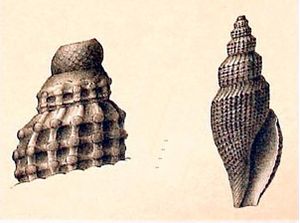Daphnella aulacoessa facts for kids
Quick facts for kids Daphnella aulacoessa |
|
|---|---|
 |
|
| Original image of a shell of Daphnella aulacoessa | |
| Scientific classification | |
| Synonyms | |
|
Daphnella aulacoessa is a fascinating species of sea snail. It is a type of marine mollusk that belongs to the family Raphitomidae. These snails live in the ocean and are known for their unique shells.
What Does It Look Like?
The shell of the Daphnella aulacoessa snail is usually white. It has a tall, narrow shape, like a spindle. The shell's main part, called the body whorl, is long and narrow. It ends in a small "snout" at the bottom.
The shell has several whorls, which are the turns of the spiral. These whorls are slightly rounded. The top part of the shell, called the spire, is tall and narrow.
Shell Patterns and Texture
The shell has interesting patterns, also known as sculpture.
- Vertical Lines: There are many fine, rounded lines that run up and down the shell. These lines show how the snail grew over time. They are separated by tiny grooves.
- Spiral Lines: Similar lines also wrap around the shell in a spiral pattern. Where the vertical and spiral lines cross, they form tiny bumps or knots.
The very top of the shell, called the apex, is small and sharp. The entire shell has about eight whorls in total. The opening of the shell, called the aperture, is long and narrow. The outer edge of this opening, called the lip, is thin and slightly wavy.
Where Does It Live?
This specific type of sea snail is found only in Australia. It lives in the marine waters off the coast of Queensland.

